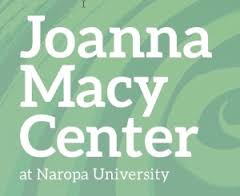NOTE: This interview excerpt is transcript only
Photo Credit: Personamedia.com
““The voice that most people need to hear is the voice from within.””
Joanna Macy is the root teacher of the Work That Reconnects, which exists to encourage the collective realization that being alive at this time is an extraordinary opportunity. As a Buddhist scholar, systems theorist and deep ecologist, Joanna is a respected voice in addressing psychological and spiritual issues of the nuclear age, the cultivation of ecological awareness, and the relationship between Buddhist thought and contemporary science. Through her books and teachings, Joanna reminds us of our potential to influence the fate of the Earth and the survival of future generations. With her radiant, uplifting and dignified presence, Joanna helps people transform despair and apathy into openings to rejoice and be useful. In this interview, she reminds us of the restorative leadership practice of being intentional with life’s resonant influence, affirming that leadership is about inspiring people’s reverence, appreciation and gratitude for the miracle of life on Earth.
On Leading Transcript
Seana Lowe Steffen, host: What are you grateful for or proud of contributing through your life’s work?
Joanna Macy, guest: I am so grateful for the Work That Reconnects. This is a form of group work that is trickling out through thousands of channels under hundreds of auspices in different ways: through churches, through schools, through various campaigns and NGOs. It’s helping people to tell the truth, helping people be present to the absolute immensity of what is befalling our people and all our brother-sister species, and to the profound concern for the future of all and this exquisite planet. The Work That Reconnects creates places where people use non-threatening methodologies to listen to each other and themselves. The voice that most people need to hear is the voice from within. By facing our pain we come to a transformed worldview and experience that the web of life works through us.
Seana: What does it mean to find one’s inner authority and how does it serve sustainability?
Joanna: The great teachers remind us that we come forth from the Earth, that we’ve got a long and venerable story. It is finding the inner authority to practice the mudra or gesture of the Buddha, touching the Earth. It is also Native Americans who touch the Earth as recognition of the interconnectedness of life that is affirmed in their practice of giving greetings and thanks consistently to life forms. I find that the universe story as it’s presented to us by Sister Miriam McGillis, Thomas Berry, Brian Swimme--this story emerging from science and the spiritual affirmation of the beauty and wonder of evolving of life--helps us feel a tremendous sense of authority. That’s what I mean when I say, “We should act our true age,” because that’s our pedigree. At least 4.5 billion years is the age of Gaia our planet, and 14 billion years is the age of our universe. Every particle and every atom and every molecule in our body goes back, back, back to that first splitting and spinning of the stars, to the first flaring forth of space and time. So that’s how I see our authority. And with credentials like that, we can find fearlessness in speaking truth and calling others to serve our living planet and the web of life evolving in complexity and intelligence. The continuity of that is what sustainability means. Any of us can claim that authority, just as the Buddha did under the Bodhi tree when Mara asked him, “By what authority do you think you have to resolve the issue of suffering?” His answer was to simply touch the Earth. He didn’t show his resume, he didn’t say anything about his particular achievements or credentials or diplomas or awards. We are here at this point in this incredibly dangerous and pregnant moment on Earth where we can, through our actions, let our intelligence and our gifts unfold for the health and beauty of life rather than its destruction. That’s sustainability.
Seana: Could you talk about the Onondaga example of leadership and why you “felt proud to be a human being” as a result of their choice?
Joanna: In the Sixth Nation Confederacy of the Haudenosaunee, also known as the Iroquois, the other nations made their legal suits to get land or money for what has been taken from them. Their treaties have been broken, and the federal and state governments have robbed them over the decades and centuries. The Onondaga, however, hadn’t made their land rights claim. People waited year after year, month after month, wondering what they were going to do. The others had gotten funds and built casinos. The Onondaga, being more traditional, weren’t interested in that. And being more traditional, their clan mothers still had the final say. They appointed the chiefs and the spiritual leaders. Then finally, four or five years ago, they held their press conference about their claim related to their ancestral lands going from Pennsylvania up to the St. Lawrence, a big swath that had been taken from them. They just have a very small area now that is theirs to use as they want. They announced that none of what was taken has to be returned, but it does have to be cleaned up for the sake of the families and the children that live there now. This was so clearly a choice made, a policy adopted, for the welfare of all. It was such generosity and nobility and wisdom to ask for this. When I heard about it, I felt proud to be a human--to see such an example of noble restraint and community. I’ve been very instructed and informed by seeing how the older women, the clan mothers, show exactly the kind of time awareness of which I was speaking. Because as you know, the Haudenosaunee are well known for keeping the seventh generation in mind with whatever decision they are making. So this is what we should do. We’re here such a little time. We’re borrowing the Earth from those that come after. That we could find the moral self-respect to try to preserve the necessary foundations, living systems of Earth, so that those who come after us, our progeny, have a decent, healthy place to live--to do that involves a whole shift in consciousness.
Seana: What will it take to bring out the best of diverse humanity to ensure a sustainable world?
Joanna: Leadership for sustainability means opening your eyes really wide with the warrior curiosity, the warrior alertness. That means you can dispense with sugar coating what you say and what you hear. Right now at this historical moment in our human journey, leadership means really facing and speaking the peril we face, as well as the promise. It means recognizing that this could very well be curtains for the human story and even for complex life forms. It could also be the beginning of what we all yearn for in our deepest souls: a life of dignity, beauty, fairness. So many people have said that this is a time when you don’t know whether you are doing deathbed attendance on planetary life or you are a midwife to a new era. That says something about leadership. Leadership means helping us see very clearly both of those realities: it is the dying of an old culture and it is the birth of a new. And we don’t know whether we’re going to make it or not. Of course that’s true in every childbirth – you don’t know. Leadership means being able to have that loving attention to the reality of the situation, that you can live with that uncertainty and that you can ask the people around you to take risks for what they most care about. We have to ask people to give up the comforts of their old opinions. We have to ask people to give up the comforts of their old antagonisms and the comforts of their old worldviews, and to bet everything on the adventure of life going forward. Leadership is to evoke people’s reverence, appreciation and gratitude for the miracle of life.
Share Joanna's Restorative Leadership Message
Click each social media image to download and share! #leadershipmatters #onleading
Engage In The Work That Reconnects
Drawing from deep ecology, systems theory and spiritual traditions, the Work That Reconnects (WTR) builds motivation, creativity, courage and solidarity for the transition to a sustainable human culture. First emerging in 1978, this pioneering, open-source body of work has its roots in the teachings and experiential methods of Joanna Macy.
The challenges we face can be difficult even to think about. Climate change, the depletion of oil, economic upheaval, and mass extinction together create a planetary emergency of overwhelming proportions. Active Hope shows us how to strengthen our capacity to face this crisis so that we can respond with unexpected resilience and creative power. Drawing on decades of teaching an empowerment approach known as the Work That Reconnects, the authors guide us through a transformational process informed by mythic journeys, modern psychology, spirituality, and holistic science. This process equips us with tools to face the mess we’re in and play our role in the collective transition, or Great Turning, to a life-sustaining society.










